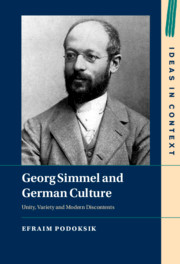Book contents
- Georg Simmel and German Culture
- Ideas in Context
- Georg Simmel and German Culture
- Copyright page
- Contents
- Acknowledgements
- Note on Translations and References
- Introduction
- Chapter 1 Bildung, Kultur, Crisis
- Chapter 2 Unity in Variety
- Chapter 3 Unity versus Variety
- Chapter 4 Unity above Variety
- Conclusion
- Bibliography
- Index
Conclusion
Published online by Cambridge University Press: 07 July 2021
- Georg Simmel and German Culture
- Ideas in Context
- Georg Simmel and German Culture
- Copyright page
- Contents
- Acknowledgements
- Note on Translations and References
- Introduction
- Chapter 1 Bildung, Kultur, Crisis
- Chapter 2 Unity in Variety
- Chapter 3 Unity versus Variety
- Chapter 4 Unity above Variety
- Conclusion
- Bibliography
- Index
Summary
In his treatise on the epistemological foundations of historical research, Simmel broadened the Kantian understanding of a priori, reformulating it in the neo-Kantian fashion as signifying ‘relational forms [Verbindungsformen], serviceable to that peculiar capacity of the mind which classifies, defines, and stresses each given mental content in such a way that it can be moulded to fit the most diverse constitutive forms’.1 Challenging the strict dichotomy between abstract perspective and empirical content, he believed that the notion of a priori could be used in a much more flexible way than had been envisioned by Kant and include contents which are themselves empirically derived and yet function in an a priori fashion, serving as presuppositions for specific branches of knowledge, such as history. Following Simmel in this regard, I will conclude my book with a few remarks on the methodological foundations of the work, or what can be described as the a priori of intellectual history, especially the kind of intellectual history which focuses on the ideas of individual minds.
Keywords
- Type
- Chapter
- Information
- Georg Simmel and German CultureUnity, Variety and Modern Discontents, pp. 293 - 295Publisher: Cambridge University PressPrint publication year: 2021

